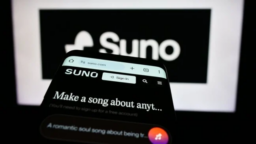In January last year, MBW broke the news that Sony Music had filed a copyright infringement lawsuit against Trefuego, a rapper behind TikTok hit 90mh.
Sony Music’s lawsuit accused Trefuego, within 90mh, of “the flagrant and deliberate infringement” of both the sound recording and underlying composition in the 1986 track Reflections, released by Japanese composer Toshifumi Hinata (Hinata). (Sony Music Entertainment owns copyrights in the sound recording;, while Sony Music Publishing’s copyrights cover the composition).
As we explained in our report at the time, the track went viral on TikTok and YouTube and racked up over 170 million Spotify streams. As we noted then, Sony had a strong case: It’s hard to mistake a sped-up key violin motif from Hinata’s track appearing, looped repeatedly, in 90mh.
The outcome of the case has now been decided, and, according to the court, Trefuego has to pay up.
In a judgment issued in a Texas court on Wednesday (March 27), Trefuego (Dantreal Daevon Clark-Rainbolt) was ordered to pay Sony Music $802,997.23 in damages, including $14,078.82 currently held by DistroKid.
Sony Music’s original lawsuit, filed in December 2022 (and which you can read in full here) claimed that “Trefuego… simply stole Hinata’s musical composition and sound recording, using them without asking and without permission, all in flagrant violation of the United States Copyright Laws.”
It added: “Trefuego’s infringing conduct has and continues to severely damage and diminish the market for Hinata’s works by falsely inferring that he endorses and/or supports Trefuego’s use of Reflections in 90mh.”
In the judgment issued this week, Sony’s motion for damages was granted in part and denied in part.
According to the order, which you can read in full here, Trefuego released the song 90mh, “which impermissibly sampled Sony’s copyrighted work” and then, “after multiple vain attempts to effectuate service, the Court allowed Sony to serve Defendant via social media direct messaging”.
The order added: “Even after Sony perfected service, Defendant evaded communications related to this lawsuit and ignored the Court’s orders”.
Sony then moved for judgment last October, and in November the Court found Trefuego liable for copyright infringement. Sony filed a motion for damages, fees, and costs in December.
Sony sought $802,997.23 in damages, $2,230.67 in costs, a permanent injunction against future infringement of its copyrights, and a percentage of future profits attributable to Defendant’s infringement”.
The parts of the motion that were granted by the court were the $802,997.23 in damages and $2,230.67 in costs.
According to the court document, “at least $700,497.23 in revenue” was generated by the infringing work, $686,418.41 of which was paid to Trefuego and $14,078.82 held by his third-party distributor (DistroKid) after it learned of Sony’s lawsuit.
The document also provides a breakdown of these amounts with SME’s and SMP’s lost license fees (see below).
Accoriding to the court, the “Defendant’s response brief did not meaningfully contest Sony’s damages computation, much less identify applicable offsets”.

The court ruled however that Sony failed “to establish the required grounds” for the permanent injunction it sought.
Sony asked the court to “permanently enjoin[] [Defendant] from copying, performing, or otherwise exploiting ‘90mh’ in any manner.”
According to the court: “Because the pleadings establish that damages would remedy any future harm, the Court DENIES the injunction Sony requests”.
It added: “However, insofar as Sony’s copyrights are jeopardized by 90mh’s public availability, some form of injunctive relief is appropriate.”
The court ruled that Trefuego is “Permanently Enjoined from copying, performing or otherwise exploiting 90mh without (1) paying 50% of revenues connected to the 90mh musical composition to Plaintiff Sony Music Publishing” and paying 20% of revenues connected to the 90mh sound recording” to Sony Music Entertainment.
“Some may query the wisdom of pursuing a claim against a relatively small fish like Trefuego, but that fact does not render Sony’s motivation improper or their lawsuit unreasonable.”
Judge Mark T. Pittman
In his order, Judge Mark T. Pittman noted that “In this case, Sony pursued a reasonable, non-frivolous claim to vindicate infringement of its copyrighted work and that “some may query the wisdom of pursuing a claim against a relatively small fish like Trefuego, but that fact does not render Sony’s motivation improper or their lawsuit unreasonable”.
He added: “In fact, the only unreasonable behavior in this case was Defendant’s, as his consistent attempts to evade service and eschew meaningful communications stymied case progress and drove up Sony’s costs.
“The Court hopes this serves as a lesson for Defendant and similarly situated litigants: the Court is sympathetic to Defendant’s willfulness arguments and could have appointed mediators and/or legal counsel to assist Defendant in raising this argument or otherwise pursuing an efficient resolution of Sony’s claim.
“While it can be daunting for many defendants to appear in federal court or respond to service of process, the only wrong answer in such circumstances is refusal to respond or to comply with court orders. You can run from process servers, but you can’t hide from the law.”Music Business Worldwide




